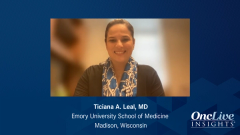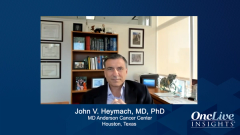
Immunotherapy in NSCLC With Concomitant KRAS/TP53 Mutations
Before closing her discussion on advanced non–small cell lung cancer, Ticiana Leal, MD, highlights the possible role of immunotherapy in patients with concomitant KRAS/TP53 mutations.
Episodes in this series

Transcript:
Ticiana A. Leal, MD: Another interesting story has come out about immunotherapy in non–small cell lung cancer that has comutations with KRAS as well as TP53, and again, thinking about how this impacts the outcome for patients who are treated with PD-1 and PD-L1 inhibitors. Some of the evidence based on retrospective studies has shown that tumors with comutations with KRAS and TP53 may be susceptible to immunotherapy. We identify TP53 mutations when we do the NGS [next-generation sequencing] testing as well, and certainly, TP53 mutations are very common in non–small cell lung cancer. So, we identify TP53 mutations on the NGS reports.
I do think as we review our NGS reports, it’s very important to look at all the mutations, including TP53. Now again, we don’t have any significant or prospective data telling us, does this change what we do for patients with KRAS and comutations with TP53? But certainly, I think this is something to be aware of and to pay attention to as new data come in with future trials.
Transcript edited for clarity.







































